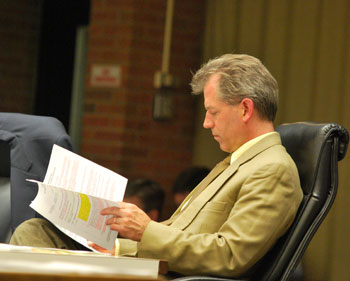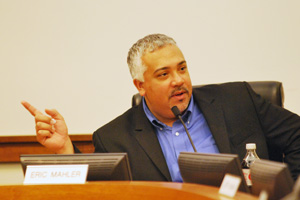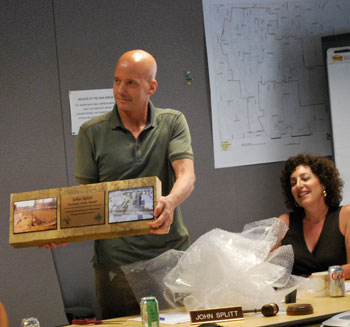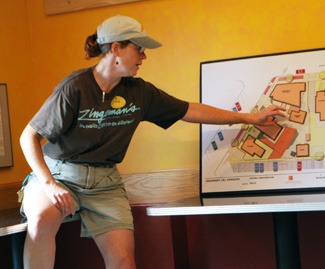Pot Laws Amended But Postponed Again
Ann Arbor city council meeting (May 2, 2011): The city council has postponed its final approval of two local medical marijuana laws at least until June 6. One law addresses zoning and the other handles licensing. With that postponement, the council stretched its formal consideration of medical marijuana regulation in the city to at least a year – it had held a June 7, 2010 closed session on the subject.

Stephen Kunselman (Ward 3) peruses a marked up copy of medical marijuana legislation. (Photos by the writer.)
On Monday, before the postponements, the council amended both medical marijuana laws, making changes to the versions to which they’d already given initial approval – all city ordinances must receive two affirmative votes at different meetings of the council. Based on the amendments approved Monday night, the votes taken on June 6 will likely count only as the first reading. If the council makes a substantive change to an ordinance after its initial approval, then the ordinance must receive an additional first reading.
Public commentary during the evening included remarks from several medical marijuana advocates, who have become a familiar cast of characters over the past year. One highlight of that commentary included corroboration of a 2004 sidewalk encounter – between a medical marijuana petition circulator and the city attorney – which had been described during public commentary at the council’s previous meeting.
Other public comment at Monday’s meeting focused on the upcoming fiscal year 2012 budget approval, with many of the remarks centered on human services funding. The council had a specific resolution on its agenda that would have allocated funding to local nonprofits that provide human services support – but the council decided to postpone the item. The funding level in the resolution would have been about 9% less than fiscal 2011 funding.
Remarks during the budget public hearing by the president of the local firefighters union focused on the number of deaths due to fire over time. During council communications, Stephen Rapundalo (Ward 2), the chair of the council’s labor committee, reiterated a point he’s made before – that if unions make concessions on their contribution to the city’s health care plan, they can mitigate some (but not all) of the currently planned layoffs.
Public commentary at Monday’s meeting also featured remarks from county clerk Larry Kestenbaum on the following day’s single-issue election, along with an update on possible changes to state election law.
The council unanimously approved the site plan, development agreement, and brownfield plan for Packard Square, a residential development planned for the former Georgetown Mall property. Two days later, the county board of commissioners postponed their approval of items related to the Packard Square brownfield plan.
In other business, the council set a public hearing on a tax abatement for Sakti3; approved several interagency technology agreements that allow for partnership between the city, Washtenaw County and the Ann Arbor Transportation Authority; and postponed consideration of some large vehicle purchases. The council was also introduced to Paul Krutko, new CEO of Ann Arbor SPARK, the local economic development agency.
Also at Monday’s meeting, Washtenaw County commissioner Yousef Rabhi explained how his interest in public service originated in connection with the Buhr Park Wet Meadow project, led by Jeannine Palms. Palms and others involved with the project, which began in 1996, were honored with a mayoral proclamation. [Full Story]








